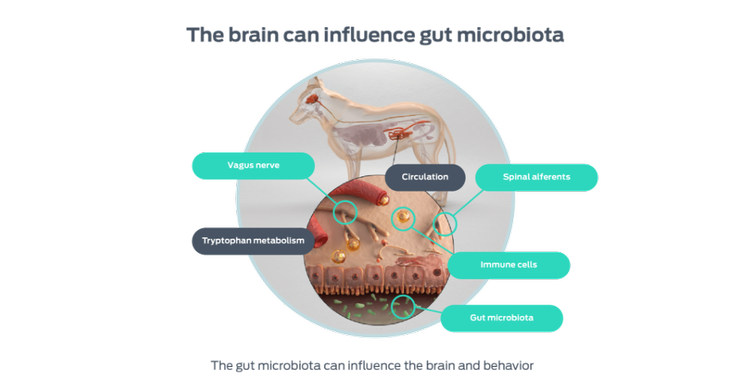
INTESTINAL VILLI WITH BACTERIA
Gut Microbiome Interactions
While the gastrointestinal tract (and its microbiome) is the center of food digestion and nutrient absorption, it also plays a key role in pets’ overall health as well as the development and progression of disease.
Dysbiosis-associated disruption of the intestinal barrier during aging has been associated with a number of age-related and chronic diseases.1,2
The large number of immune cells residing in the gastrointestinal tract comprise the majority of the immune system, providing the gut microbiome with endless access and opportunity to shape the body’s immune and inflammatory responses.3,4
This direct connection to the immune system has widespread influence in the host, and likely mediates many of the interactions between the microbiome and host. For example, microbiome-associated alterations of the immune response have been linked to inflammatory airway conditions – representing a gut-lung axis.5
The gut microbiome interacts with the host to influence host metabolism, and dysbiosis has been associated with metabolic disorders such as obesity and type 2 diabetes.4,6,7
The microbiome's influence on metabolism may be mediated through the host's immune system as well as through the production of vitamins, short-chain fatty acids, amino acids and microbial metabolites that influence the cellular pathways associated with host metabolism.4
There is growing evidence that an individual’s gut microbiome may protect the individual from allergic and atopic disease, and dysbiosis may contribute to the development of allergies.8 The gut microbiome’s role in the development and potentiation of skin disease is be mediated through immune system regulation and cytokine production.3
In humans, the development of sensitization or tolerance to some allergens is induced if the first exposure to the allergen is through the skin or ingestion, respectively.3 A number of cytokines – such as interleukin(IL)-9, IL-13, IL-25 and IL-33 – play key roles in the gut-skin axis and the development of cutaneous comorbidities associated with food allergy.3

The gut microbiome also regulates the development and function of the brain through immune, neuroendocrine, and neural (via enteric nervous system and vagal nerve) pathways, commonly called the microbiota-gut-brain axis – or, more simply, the gut-brain axis.1,6 The gut-brain axis plays a critical role in cognitive function, and dysbiosis of the gut microbiome has been correlated with neuroinflammation and a number of conditions such as anxiety disorders, cognitive impairment and dementia.1
Explore other areas of the Microbiome Forum
Find out more
- Wu, M.-L., Yang, X.-Q., Xue, L. Duan, W., & Du, J.-R. (2021). Age-related cognitive decline is associated with microbiota-gut-brain axis disorders and neuroinflammation in mice. Behavioural Brain Research, 402, 113125. doi:10.1016/j.bbr.2021.113125
- Kim, M., & Benayoun, B. A. (2020). The microbiome: An emerging key player in aging and longevity. Translational Medicine of Aging, 4, 103-106. doi: 10.1016/j.tma.2020.07.004
- van Splunter, M., Lui, L, Joost van Neerven, R. J., WIchers, H. J., Hettinga, K. A., & de Jong, N. W. (2020). Mechanisms underlying the skin-gut cross talk in the development of IgE-mediated food allergy. Nutrients, 12, 3830. doi:10.3390/nu12123830
- Belizário, J. E., Faintuch, J., & Garay-Malpartida, M. (2018). Gut microbiome dysbiosis and immunometabolism: New frontiers for treatment of metabolic disease. Mediators of Inflammation, 2018, 2037838. doi:10.1155/2018/2037838
- Dang, A. T., & Marsland, B. J. (2019). Microbes, metabolites, and the gut-lung axis. Mucosal Immunity, 12, 843–850. doi:10.1038/ s41385-019-0160-6
- Richards, P., Thornberry, N. A., & Pinto, S. (2021). The gut-brain axis: Identification of new therapeutic approaches for Type 2 diabetes, obesity, and related disorders. Molecular Metabolism, 46, 101175. doi:10.1016/j.molmet.2021.101175
- Belas, A., Marques, C., & Pomba, C. (2020). The gut microbiome and antimicrobial resistance in companion animals. In Duarte, A. & Lopes da Costa, L. (Eds.), Advances in Animal Health, Medicine and Production (1st ed.), pp. 233–245. Springer International Publishing
- Koidl, L., & Untersmayr, E. (2021). The clinical implications of the microbiome in the development of allergy diseases. Expert Review of Clinical Immunology, 17, 115—126. doi:10.1080/1744666X.2021.1874353

